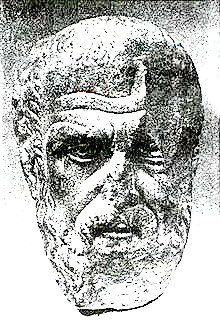
Back أريانوس Arabic اريانوس ARZ Флавій Арыян Byelorussian Ариан Bulgarian Flavi Arrià Catalan Arriános Czech Arrian Danish Arrian German Φλάβιος Αρριανός Greek Flavio Arriano Spanish
Arrian | |
|---|---|
 Bust of Arrian | |
| Born | Lucius Flavius Arrianus c. 86 |
| Died | c. 160[1] (aged 73–74) |
| Nationality | Greek |
| Occupation(s) | Historian, public servant, military commander and philosopher |
| Notable work | The Anabasis of Alexander Indica Periplus of the Euxine Sea |
Arrian of Nicomedia (/ˈæriən/; Greek: Ἀρριανός Arrianos; Latin: Lucius Flavius Arrianus;[2] c. 86/89 – c. after 146/160 AD)[3][4] was a Greek historian, public servant, military commander, and philosopher of the Roman period.[4]
The Anabasis of Alexander by Arrian is considered the best source on the campaigns of Alexander the Great. Scholars have generally preferred Arrian to other extant primary sources, though this attitude has changed somewhat in light of modern studies into Arrian's method.[5][6]
- ^ "Arrian". www.britannica.com. Retrieved 7 January 2010.
Arrian born c. AD 86, Nicomedia, Bithynia [now İzmit, Tur.] died c. AD 160, Athens? [Greece].
- ^ Stadter's suggestion that his official name was Lucius Flavius Arrianus Xenophon (Stadter, Philip (1967). "Flavius Arrianus: The New Xenophon". Greek, Roman and Byzantine Studies. Retrieved 14 April 2016.) is disproven by epigraphic evidence: Bowie, E. L. “Greeks and Their Past in the Second Sophistic.” Past & Present, 46 (1970): 25 n. 72.
- ^ F. W. Walbank, ed. (1984). The Cambridge Ancient History. Cambridge University Press. ISBN 052123445X. Retrieved 1 April 2015.
- ^ a b "Arrian". www.britannica.com. Retrieved 7 January 2010.
Arrian (born c. ad 86, Nicomedia, Bithynia [now İzmit, Turkey] died circa 160, Athens, [Greece]) Greek historian and philosopher, who was one of the most distinguished authors of second-century Roman Empire.
Wolfgang Haase; Hildegard Temporini (1990). Aufstieg und Niedergang der römischen Welt: Geschichte und Kultur Roms im Spiegel der neueren Forschung, Volume 2; Volume 34. Walter de Gruyter. p. 228. ISBN 3110103761.Arrian was of Greek stock, from the provincial aristocracy of Bithynia. His full name, L. Flavius Arrianus, demonstrates that he was a Roman citizen and suggests that the citizenship went back several generations, probably to the triumphal period. Arrian's home city was the Bithynian capital, Nicomedia, where he held the priesthood of Demeter and Kore, its patron deities.
Arrian; Sélincourt, Aubrey De (1971). The campaigns of Alexander. Penguin Classics. p. 13. ISBN 0140442537.Flavius Arrianus Xenophon, to give him his full name, was a Greek, born at Nicomedia, the capital of the Roman province of Bithynia, probably a few years before AD 90.
Grant, Michael (1992). Readings in the classical historians. Scribner's. p. 544. ISBN 0684192454.Arrian: Greek Historian ... was an approximate contemporary of Appian, born about AD 95. Like him a Greek, he came from Nicomedia (İzmit) in Bithynia (north-western Asia-Minor) where his family was prominent.
- ^ Heckel, Waldemar (2004). The History of Alexander. Penguin. pp. 5 & 269.
- ^ Bosworth, A.B. (1976). "Errors in Arrian". Classical Quarterly. 26: 117–139. doi:10.1017/s0009838800033905. S2CID 170453455.